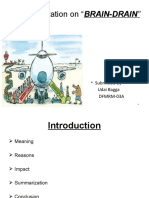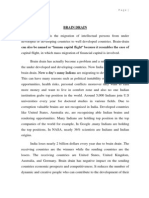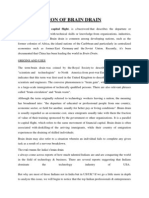Brain Drain
Brain Drain
Uploaded by
vikasbumcaCopyright:
Available Formats
Brain Drain
Brain Drain
Uploaded by
vikasbumcaOriginal Description:
Original Title
Copyright
Available Formats
Share this document
Did you find this document useful?
Is this content inappropriate?
Copyright:
Available Formats
Brain Drain
Brain Drain
Uploaded by
vikasbumcaCopyright:
Available Formats
The term 'Brain-drain' has recently come into vogue for describing the flight of talent from our
country to another. Often, it is loosely employed to describe all migration of educated and talented persons to countries abroad in search of better careers even though their services may be badly needed in their native land, and thus, this exodus of talent, depletes a country's intellectual resources and tells on national life. However, the problem of 'Brain-drain' is not peculiar to the present age of ours. It existed even in Medieval times when great conquerors carried away not only hoards of gold and rich treasures from the vanquished countries, but they also took away men of talent and genius as a matter of right. The only difference we see today is that now the talented and educated persons migrate of their own accord, attracted by the glitter and glamour of better emoluments and amenities. Today, the problem of Brain-drain is a product of the revolution in science and technology inspired by the Second World War and speeded up by the discovery and use of the nuclear energy. After the war, the stupendous advance made by U.S.A., U. S. S. R., Great Britain, Germany etc. in the field of scientific research began to attract men of science and talent from other Countries. This accounted in the main for the flight or defection or let us says migration of talent from the underdeveloped countries to these advanced nations. One striking feature of this problem of Brain-drain is that it is a global phenomenon, affecting almost every country. India, too, has been facing this problem and it is discussed from time to time in a rather casual and cursory manner. It is revived with afresh momentum when some Indian repatriate in another country achieves some distinction in his field of work. It caught the headlines when Dr. Jayant Narlikar discovered his HoyleNarlikar Theory, when Dr. Hargobind Khurana was awarded the Nobel Prize for Medicine in 1968, and also when the famous India-born U.S. astrophysicist Dr. S. Chandrashekbara came to India to deliver the Second Nehru Memorial Lecture in New Delhi. Similarly, Dr. Lars Onsager, Norway-born U. S. citizen was awarded Nobel Prize in Chemistry in 1968. Cases like these provoke and set in motion 'long drawn debates on the subject of Braindrain. But these discussions, except for blaming these men of genius for lack of patriotic telling and sense of duty to their land of birth and for cupidity, do not yield any results because (i) such cases are only exceptions and not the general rule, (ii) the distinction and achievement these men of genius secured in their land of repatriation could not have been possible, or of much value, in their land of birth, and (iii) the loss of one single country is a colossal gain to the world at large.
Let us also analyze the reasons which prompt such people to leave the land of their birth for foreign shores. Is it merely the enchantment and glamour of life in more affluent countries, or is it the search for a more satisfying professional career. An overwhelming majority of such repatriates go abroad as students seeking academic, scientific or technological education which is sadly lacking in their own countries. More often than not, such advanced courses of training are designed to benefit the host country. Naturally, such an education has no market in their native countries, and quite obviously, they cannot be accommodated there. So they are forced to seek voluntary exile to settle in .the country of their learning. One more factor deserves consideration. After a promising young-man has completed his training, he usually expects work which should not only bring in enough money and other emoluments but also give him sufficient professional satisfaction. But a greater contributing factor to this problem of Brain-drain is the unimaginative handling of the issue by the most callous and unimaginative bureaucracy of the country. The research workers and men of genius are men out of the ordinary and their work is of an extraordinary nature. But bureaucracy fails to cope with such people for it lacks the intellectual equipment and sensibility needed to handle such volatile human material. Very often, this becomes the main deciding factor for the emigrant, with other factors acting as catalytic agents. In India, the pattern of Brain-drain has caught the public eye very recently. Facts and figures are put forward to emphasize the terrible loss being caused to the country as a result of this phenomenon. The Scientific and Technical Personnel Division of the Council of Scientific and Industrial Research (GSIR) issued in 1962 the 'Indians Abroad Roster' which gives an approximate figure of 29,000 skilled scientists, engineers, doctors, teachers and technical personnel migrating to foreign countries. However, this statistics is not factually accurate, and so, this does not reflect the magnitude of the problem, the Brain-drain coming to about 3 per cent of the skilled personnel available in India. But what is really alarming is the information that the average age of migrants is between 20 and 40 years. This means that India is losing the cream of the intelligentsia at the most productive period of their life. The Government of India set up the Council of Scientific and Industrial Research, partly with a view to meeting the problem of Brain-drain. The C.S.I.R. installed in 1958 the scheme of scientists' pool as a device for bringing back highly qualified Indian nationals from abroad. On papers this scheme has been doing some service but in actual practice the scheme has flopped owing to various simple reasons viz., a yawning discrepancy in salary and emoluments and a severe lack of research-cum- workshop facilities for the highly skilled and specialized scientists.
The problem of Brain-drain should be tackled at national and international level on a broadbased and rational pattern, for it is a global issue. On the national level, a country like India, should ameliorate the working conditions of scientists and equip the laboratories with latest technology. Internationally, the country gaining by Brain-drain must compensate the losing country by sending her scientists in return.
Brain drain is an often a familiar expression. This refers to the export, or going out of Indian brains to different countries. We term it as a drain of the brains; for, it is believed that the India is at a loss, when our best brains work for other countries leaving some mediocre and the lesser brains. Let us analyze why there was so much of exodus of brainpower from India and regulate such drain by some norms. It is a matter of pride for Indians that the world, as of today, has recognized the Indian brain among the best across the world. This is why foreign countries encourage over the import of the Indian manpower. On the other hand, the owners inheriting such brains are happy to go out because of having congenial work atmosphere and ethos. In foreign countries, there is appreciation for good work, and the environment remains work-friendly, unlike in India. Besides, they get handsome pay packet. With this situation, in which, both the Indian brains and the foreign countries find it lucrative and satisfying, why should it be stopped? I feel that, it should be curtailed, if not stopped because, if the best goes out, what are the prospects of developments in our country? For, we, ourselves were to be blamed. If we make the atmosphere healthier for some good work, I feel at least some of the brains may stay back in India. We have to accept that India is at a loss with the loss of expertise but, we cannot really blame the people going out as, who does not want to improve his/ her standard of life? The fact of their going out on the face of it does appear to be unfair to India. For, when we have the know-how, the expertise, why should we not reap the benefit? However, in order to take advantage, we have to do something to lure them to stay within, for which I dare say, India has to do a lot of homework. The loss of a country when skilled and intelligent people leave it to go and live in other countries for better opportunities is called brain drain. In India the tendency to go abroad is growing rapidly. The growing urge among the Indian families to send their children to foreign lands especially the west is getting
even stronger despite the fact that our country is in no way lacking in having excellent educational institutions. The urge to go to the west has become compelling in our country in postindependence years. If we look into the reason for the brain drain phenomenon, it will be cleared that the educational pattern of country is not up to the mark. It does not serve the needs of the country. Other reasons are unrecognised or unrewarded talents and lack of job opportunities for trained professionals. This is the start of the brain drain of the young. Lure of higher salaries in hard currency, better living and favourable conditions of setting down with the family also prompt highly qualified Indians to look to the west for jobs. In the year 1966-1970 thousands of Indian professionals made their way to the US, which is really vexy shocking. India has proved to be the fount of more than a fourth of the skilled immigrants to the US, the major part of this brain drain being borne by the medical faculties. According to the World Health Organisation, India is the largest donor of medical manpower in the world. Just imagine the situation of the medical manpower in the country itself. Then we would have better health care within our approach. Thus, India is in double loss. She is not only losing these professionals but also the resources invested in their training. For instance, the governments spends two lakhs on every IIT graduate it is seen that one out of every three of these settles in the US after going these for higher studies. The earnings and remmittances from the Indians settled abroad or their eventual return are poor compensation for the lasting and serious loss inflicted by their outflow. The specific objectives of the anti-brain -drain policies, within the framework of independent development, are to bring back to a limited extent, the lost talents and skills from abroad and reduce the outflow in the short run and finally end it except that necissiated by genuine, multi-lateral international dependence. It is really a good sign that there is a significant 'return flow' of people who went abroad to study and choose to become Americans or British citizens. Now it has been seen that even professionals like doctors want to return because they are sure that they will earn equivalent amounts in India too.
You might also like
- Yamaha V-Star 650 Shop ManualDocument360 pagesYamaha V-Star 650 Shop ManualRıdvan Kurtuldu100% (3)
- Roadwork Projects Quality Control PlanDocument17 pagesRoadwork Projects Quality Control PlanSPHERICBLUE100% (2)
- Bikesh SharmaDocument60 pagesBikesh SharmacybostreamsNo ratings yet
- Ajanta Ellora Cave Power Point PresentationDocument26 pagesAjanta Ellora Cave Power Point PresentationadyaNo ratings yet
- Brain DrainDocument11 pagesBrain DrainAnjana DeviNo ratings yet
- Problem of Brain Drain in IndiaDocument3 pagesProblem of Brain Drain in IndiaHardik PatelNo ratings yet
- DhamanDocument20 pagesDhamanAman BrarNo ratings yet
- Human Capital Flight.......Document7 pagesHuman Capital Flight.......Ravi GuptaNo ratings yet
- Cure To This Disease: Human Capital Flight, Sometimes Called Brain Drain, Refers To TheDocument3 pagesCure To This Disease: Human Capital Flight, Sometimes Called Brain Drain, Refers To TheNaveen GaurNo ratings yet
- From Brain Drains Into Brain GainsDocument9 pagesFrom Brain Drains Into Brain GainsBimaPutraPratamaNo ratings yet
- Brain DrainDocument4 pagesBrain DrainankurNo ratings yet
- Short Speech OnDocument10 pagesShort Speech OnAnshuman PandeyNo ratings yet
- Brain DrainDocument11 pagesBrain DrainJohn AjishNo ratings yet
- Thesis Statement On Brain DrainDocument8 pagesThesis Statement On Brain Drainmelissahewittpalmbay100% (2)
- Brain DrainDocument6 pagesBrain Drainshekhar3843No ratings yet
- Brain DrainDocument2 pagesBrain DrainPedro ThunderNo ratings yet
- Brain Drain Vs Brain GainDocument11 pagesBrain Drain Vs Brain Gainn_sreevidyaNo ratings yet
- The Presentation On "BRAIN-DRAIN": - Submitted by BrajeshDocument13 pagesThe Presentation On "BRAIN-DRAIN": - Submitted by BrajeshbrajeshsinghfddNo ratings yet
- Brain Drain Final ProjectDocument35 pagesBrain Drain Final ProjectSuraj PatelNo ratings yet
- Brain Drain by Foreign Education MarketDocument3 pagesBrain Drain by Foreign Education MarketGeerthana Arasu100% (1)
- Submitted By:-Karamjit Kaur Submitted By: - M.B.A. (Finance) 2 Year (Sec. B) 17421061Document18 pagesSubmitted By:-Karamjit Kaur Submitted By: - M.B.A. (Finance) 2 Year (Sec. B) 17421061Karan KumarNo ratings yet
- The Presentation On "BRAIN-DRAIN": - Submitted by Udai Bagga DFMRM-03ADocument14 pagesThe Presentation On "BRAIN-DRAIN": - Submitted by Udai Bagga DFMRM-03AUdai BaggaNo ratings yet
- Why PK Student Like To Go AbroadDocument36 pagesWhy PK Student Like To Go AbroadFarhan Badar SiddiquiNo ratings yet
- Brain DrainDocument20 pagesBrain DrainGourav Sharma100% (3)
- SAMPLE - Brain DrainDocument9 pagesSAMPLE - Brain Drainnyeinhtwehtwe96No ratings yet
- A012 Drishti Bhatia EconomicsDocument22 pagesA012 Drishti Bhatia EconomicsDrishti BhatiaNo ratings yet
- Brain Drain From PakistanDocument6 pagesBrain Drain From PakistanSajid Munir KalyarNo ratings yet
- Brain Drain WhatDocument20 pagesBrain Drain Whatahmad_123No ratings yet
- Literature Review Brain DrainDocument7 pagesLiterature Review Brain Drainvmehykrif100% (1)
- Name:Spandan Banerjee Mobile:9474490581 Institution Name:Ramakrishna Mission Vidyamandira, Belur Math, Howrah-711202 Year of Study:2ndDocument6 pagesName:Spandan Banerjee Mobile:9474490581 Institution Name:Ramakrishna Mission Vidyamandira, Belur Math, Howrah-711202 Year of Study:2ndSpandan BandyopadhyayNo ratings yet
- Brain Drain vs. Wisdom Gain!!!Document2 pagesBrain Drain vs. Wisdom Gain!!!Anonymous Rb6XXLzNo ratings yet
- Debate ElectionsDocument10 pagesDebate Electionsosman cetinNo ratings yet
- Direction: Read Carefully The Text and Answer Based On Your Comprehension. Print Out The Text and Your Answers and Bring To The ClassDocument9 pagesDirection: Read Carefully The Text and Answer Based On Your Comprehension. Print Out The Text and Your Answers and Bring To The ClassSel Fii SelfiiNo ratings yet
- Brain Drain: Socio-Economic Impact On Indian Society: Raveesh SDocument6 pagesBrain Drain: Socio-Economic Impact On Indian Society: Raveesh SVikash KumarNo ratings yet
- Drishti Bhatia - EconomicsDocument22 pagesDrishti Bhatia - EconomicsDrishti BhatiaNo ratings yet
- Brain Drain in PakistanDocument14 pagesBrain Drain in Pakistani232029No ratings yet
- B 1Document25 pagesB 1Sabin SadafNo ratings yet
- Thesis On Brain Drain in IndiaDocument5 pagesThesis On Brain Drain in Indiafjmzktm7100% (1)
- Quotes On EducationDocument8 pagesQuotes On EducationPalak AgrawalNo ratings yet
- Brain Drain Research Paper-With CommentsDocument9 pagesBrain Drain Research Paper-With CommentsAnushka YaduvanshNo ratings yet
- Brain Drain DissertationDocument8 pagesBrain Drain DissertationPaperWritingServiceCanada100% (1)
- Brain Drain: DefinitionDocument2 pagesBrain Drain: Definitionblazzer12No ratings yet
- Kushal Thakkar - FinalDocument16 pagesKushal Thakkar - FinalKushal ThakkarNo ratings yet
- Brain DrainDocument2 pagesBrain DrainSubramaniam GanesanNo ratings yet
- Thesis On Brain DrainDocument6 pagesThesis On Brain DrainChristina Bauer100% (1)
- Chapter 10Document22 pagesChapter 10krupamayekarNo ratings yet
- Does Nobel Grow On TreesDocument3 pagesDoes Nobel Grow On TreesnarendrabisoyiNo ratings yet
- DebateDocument3 pagesDebatepurupanoti72No ratings yet
- The Term Brain Drain Was Coined by The Spokesmen of The Royal Society of London To Describe The Outflow of Scientists and Technologists To The United States and Canada in The Early 1950sDocument4 pagesThe Term Brain Drain Was Coined by The Spokesmen of The Royal Society of London To Describe The Outflow of Scientists and Technologists To The United States and Canada in The Early 1950shasne1No ratings yet
- Pakistan at 2047Document6 pagesPakistan at 2047muhammad awaisNo ratings yet
- Brain Drain: Presenter: Kushal ThakkarDocument15 pagesBrain Drain: Presenter: Kushal ThakkarKushal ThakkarNo ratings yet
- 1.1 Background of Studies: Individuals ("Human Capital") To Other Nations or JurisdictionsDocument18 pages1.1 Background of Studies: Individuals ("Human Capital") To Other Nations or JurisdictionssatyaNo ratings yet
- What Is Brain DrainDocument5 pagesWhat Is Brain DrainNeel NarsinghaniNo ratings yet
- Brain DrainDocument49 pagesBrain DrainKhairunnisa SharomNo ratings yet
- Pak EconomyDocument22 pagesPak EconomyCh Arslan BashirNo ratings yet
- Cultura Inglesa: Universidad Autónoma de Nuevo León Facultad de Ingeniería Mecánica y EléctricaDocument5 pagesCultura Inglesa: Universidad Autónoma de Nuevo León Facultad de Ingeniería Mecánica y Eléctricaguillermo floresNo ratings yet
- Brain Drain The Great Indian MigrationDocument6 pagesBrain Drain The Great Indian Migrationshagorika.cNo ratings yet
- Unit 10: Brain Drain Review / 2BAC: Reading ComprehensionDocument4 pagesUnit 10: Brain Drain Review / 2BAC: Reading ComprehensionImad AminNo ratings yet
- Introduction of Brain DrainDocument8 pagesIntroduction of Brain Drainkrupamayekar0% (1)
- What Is Brain DrainDocument2 pagesWhat Is Brain DrainmohrifNo ratings yet
- A Study On The Impact of Brain Drain in Indian EconomyDocument5 pagesA Study On The Impact of Brain Drain in Indian Economyidharma1947No ratings yet
- Role of Science and Technology in National DevelopmentDocument8 pagesRole of Science and Technology in National DevelopmentsriramkrajanNo ratings yet
- The Stupidity Paradox: The Power and Pitfalls of Functional Stupidity at WorkFrom EverandThe Stupidity Paradox: The Power and Pitfalls of Functional Stupidity at WorkRating: 4 out of 5 stars4/5 (10)
- Up Lower Subordinate 2013Document5 pagesUp Lower Subordinate 2013Raaj SinghNo ratings yet
- Assign Shipping Point To Plant: ActionsDocument1 pageAssign Shipping Point To Plant: ActionsvikasbumcaNo ratings yet
- October November 2007 Issue Sap Tips 495Document69 pagesOctober November 2007 Issue Sap Tips 495vikasbumcaNo ratings yet
- How To Add A Logo Into The MIME RepositoryDocument12 pagesHow To Add A Logo Into The MIME RepositoryvikasbumcaNo ratings yet
- Chapter 4. MDM Repository MaintenanceDocument1 pageChapter 4. MDM Repository MaintenancevikasbumcaNo ratings yet
- Enterprise Structure: General LedgerDocument5 pagesEnterprise Structure: General LedgervikasbumcaNo ratings yet
- PLNT Doc. Date Purch - Doc. Material Short Text Matl Group Vendor/Supplying Plant Net Price Quantity Oun Net ValueDocument1 pagePLNT Doc. Date Purch - Doc. Material Short Text Matl Group Vendor/Supplying Plant Net Price Quantity Oun Net ValuevikasbumcaNo ratings yet
- 28.WH SOP 12 FMT 01 CycleCountSheet 20080724063151.875 XDocument1 page28.WH SOP 12 FMT 01 CycleCountSheet 20080724063151.875 XvikasbumcaNo ratings yet
- WH SOP 15 RetrievalProcess 20080724063701.688 XDocument2 pagesWH SOP 15 RetrievalProcess 20080724063701.688 XvikasbumcaNo ratings yet
- 12.WH SOP 11 PhysicalInventoryProcess 20080724063811.675 XDocument2 pages12.WH SOP 11 PhysicalInventoryProcess 20080724063811.675 Xvikasbumca100% (1)
- 28.WH SOP 12 FMT 01 CycleCountSheet 20080724063151.875 XDocument1 page28.WH SOP 12 FMT 01 CycleCountSheet 20080724063151.875 XvikasbumcaNo ratings yet
- 22.WH SOP 21 HOusekeeping 20080724063434.335 XDocument2 pages22.WH SOP 21 HOusekeeping 20080724063434.335 Xvikasbumca100% (1)
- WH SOP 15 RetrievalProcess 20080724063701.688 XDocument2 pagesWH SOP 15 RetrievalProcess 20080724063701.688 XvikasbumcaNo ratings yet
- 17.WH SOP 16 AssetDeploymentProcess 20080724063644.007 XDocument1 page17.WH SOP 16 AssetDeploymentProcess 20080724063644.007 XvikasbumcaNo ratings yet
- 32.BlindCountProcess 20080724063035.418 X PDFDocument1 page32.BlindCountProcess 20080724063035.418 X PDFvikasbumcaNo ratings yet
- 23.WH SOP SAP 01 GoodsReceipt 20080724063408.056 XDocument13 pages23.WH SOP SAP 01 GoodsReceipt 20080724063408.056 XvikasbumcaNo ratings yet
- 9.WH SOP 08 GoodsIssueProcess 20080724063856.288 XDocument2 pages9.WH SOP 08 GoodsIssueProcess 20080724063856.288 Xvikasbumca0% (1)
- Typical Questions & AnswersDocument32 pagesTypical Questions & AnswersJatin GaurNo ratings yet
- Connection Summer 2015Document23 pagesConnection Summer 2015frankytgNo ratings yet
- Oracle Rac in Oracle Linux KVMDocument33 pagesOracle Rac in Oracle Linux KVMmghomriNo ratings yet
- Goal Dependency Architecture Using Object-Role Modeling in Role-Relationship of Object-Oriented DatabasesDocument9 pagesGoal Dependency Architecture Using Object-Role Modeling in Role-Relationship of Object-Oriented DatabasesInternational Journal of Innovative Science and Research TechnologyNo ratings yet
- Final Exam For EappDocument3 pagesFinal Exam For EappKirk Kervin OrpillaNo ratings yet
- Chapter One: Reinforced Concrete Structures 2Document51 pagesChapter One: Reinforced Concrete Structures 2Olesea NesterencoNo ratings yet
- SABB Platinum Visa Credit Card StatementDocument2 pagesSABB Platinum Visa Credit Card StatementMujahed AhmedNo ratings yet
- Lecture 6-Measure of Central Tendency-ExampleDocument36 pagesLecture 6-Measure of Central Tendency-ExampleamirhazieqNo ratings yet
- Unit 4 Sessionwise Problems ModifiedDocument9 pagesUnit 4 Sessionwise Problems Modified7csnty5wvgNo ratings yet
- Experiment No: 2: Study of SRM University Supersonic Wind TunnelDocument16 pagesExperiment No: 2: Study of SRM University Supersonic Wind Tunnelbad guyNo ratings yet
- Contemporary South AsiaDocument10 pagesContemporary South AsiaDiane WatsonNo ratings yet
- Gs Battery (U.S.A.) Inc.: Material Safety Data SheetDocument2 pagesGs Battery (U.S.A.) Inc.: Material Safety Data SheetGanjar PangNo ratings yet
- Chapter 2Document13 pagesChapter 2sigit wicaksonoNo ratings yet
- Baja Be 500 Owners ManualDocument29 pagesBaja Be 500 Owners ManualDragos EnacheNo ratings yet
- What Is A Risk Management PlanDocument2 pagesWhat Is A Risk Management PlanAre Pee Etc100% (1)
- 2018 - Year 1 March AssessmentDocument6 pages2018 - Year 1 March Assessmentlivina1009No ratings yet
- Way Off The It Was $4000Document7 pagesWay Off The It Was $4000Đức PhạmNo ratings yet
- Modalpartikel)Document14 pagesModalpartikel)sonjitadeyNo ratings yet
- Mena CuisineDocument64 pagesMena CuisinearunvincentNo ratings yet
- The Creative Process: Learning ObjectivesDocument11 pagesThe Creative Process: Learning ObjectivesAndrés CastroNo ratings yet
- Pengaruh Gaya Kepemimpinan Dan Iklim Komunikasi Terhadap Organizational Citizenship Behavior (Ocb) (Survei Pada PT Mulia Mega Makmur)Document27 pagesPengaruh Gaya Kepemimpinan Dan Iklim Komunikasi Terhadap Organizational Citizenship Behavior (Ocb) (Survei Pada PT Mulia Mega Makmur)Nely SofwaNo ratings yet
- Uvm UnderstandingDocument8 pagesUvm UnderstandingLokesh KumarNo ratings yet
- General Electric Model PG9171 (E) Gas Turbine: Estim A Ted Performance - Configuration: DLN CombustorDocument1 pageGeneral Electric Model PG9171 (E) Gas Turbine: Estim A Ted Performance - Configuration: DLN Combustorkarim karimNo ratings yet
- Cisco Certified Network Associate (CCNA)Document14 pagesCisco Certified Network Associate (CCNA)Ajit WaderNo ratings yet
- Jes 2 CommandsDocument7 pagesJes 2 Commandsvchinnakotla786No ratings yet
- Business Organization 2 Course OutlineDocument6 pagesBusiness Organization 2 Course OutlineGale Charm SeñerezNo ratings yet








































































































